- Home
- Bridget Barton
A Bride for the Betrayed Earl Page 2
A Bride for the Betrayed Earl Read online
Page 2
Chapter 2
“I must say, I really am looking forward to this afternoon,” Emmeline Fitzgerald said as she once again looked at her reflection in the mirror. “I do so love a garden party, especially on a beautiful summer’s day such as this. It feels like a new beginning somehow.”
And it really did feel like a new beginning after all the sorrow of the last weeks. Her father had died three months before, and now that she was only in half-mourning, she was able to partake of society again fully and no longer wore black, as her poor mother still did.
Although Emmeline had received visitors throughout the first three months and even gone out for tea in the home of her friend and that of the young man she was courting, the garden party was to be her first social event since she, her mother, and her sister had laid her father to rest.
“And you do look so much better, my dear,” Clara Lovett, Emily’s dearest friend, spoke with care. “You are to get as much out of the day as you possibly can.”
“It will just be so nice to be out of doors and to have so much company. I loved my father dearly, but I cannot help thinking that these accepted periods of mourning do little to make things better. I wish we lived in a society where we could celebrate the lives of those we have lost, instead of being expected to wish ourselves in the grave alongside.”
“Yes, I know what you mean, Emmeline. And I am glad that you have recovered so well; your father would be pleased.”
“I do believe that he would, Clara. He was never a man to wallow in pity and sadness, even at the end when he was so unwell. Even when he knew quite what his passing would mean for the rest of us, not just in terms of sadness, but in terms of security.”
“Another part of our accepted ways which we shall not celebrate, my dear,” Clara said and looked a little uncomfortable.
Quite why Clara Lovett should look uncomfortable, Emmeline could not begin to imagine. After all, they had been friends for a number of years, and Clara knew well of the circumstances of Emmeline and her family.
Try as they might, Charles and Constance Fitzgerald had never been able to produce a son. If they had, then the last years might not have been tainted with so much worry. Their small estate of Tarlton Manor would have been safe, and the fate of Constance and her two daughters not quite so uncertain.
“Of course, I am very fortunate in many ways, and I do not forget it,” Emmeline said and smiled brightly, keen to clear the look of consternation on her dear friend’s face. “And at least when my father finally departed this world, he knew that his wife and daughters were all saved.”
“Yes, but you are still to lose Tarlton, whatever happens,” Clara said quietly.
“Yes, and it is of great sadness to me to think that we have but six months left of our period of grace before we must leave here. But really, things could have been so much worse. What if I had not had the good fortune to be courted by so wonderful a man as Christopher Lennox? What if I had no man I was sure of to marry and no means to support my mother and sister when we finally come to leave this place? But it is not so, and for that I am grateful.”
“Indeed,” Clara said and seemed to look more uncomfortable still.
“Of course, I do not relish the idea of Kent Fitzgerald taking my father’s place in this house. In truth, it feels as if a stranger will be taking our home, and it somehow makes it seem even more wrong. But I ought not to dwell on these things, or I shall make myself low again. I shall dwell only on my dear Christopher and how my marriage to him shall make all well again.”
“And you are quite sure you are to marry?” Clara said cautiously.
“Of course,” Emmeline said and laughed. “I know it is not announced, but Christopher and I have spoken of it many times. Even before my father was ill, Christopher and I were destined to be together. It is not simply a marriage of convenience, but it shall be one of great love.” Emmeline smiled when she thought of Christopher.
Christopher Lennox, the wealthy young man who had courted her for almost two years, was just about the most handsome man Emmeline had ever seen. He was tall and nicely shaped, with brown hair which tended to look a little red in the sunshine, almost the colour of fox fur. And his eyes were pale blue and large and looked so well against the pale skin of his face.
But when she thought of him, Emmeline thought only of the good. Surely there was only good, after all. And yet she knew that there was something else; something which she knew was there but did not look at, almost as if she were a young child fearing to open her eyes in the darkness in case she saw a ghost standing at the foot of her bed. Emmeline did not know what it was, nor even if it was really there, and yet she felt sure that something, something tiny and intangible, had changed. But she could not look at it, and she most certainly would not speak of it.
“It is just that, as you say, there has never been anything spoken. Christopher has never announced his intention to marry you, and surely time is running short,” Clara still spoke cautiously, her large eyes peering out from beneath a great cloud of golden ringlets.
“I have no reason to doubt him, Clara,” Emmeline said feeling a little annoyed.
She felt sure that she was overreacting, not to mention a little guilty that she had snapped at her dearest friend. After all, Clara was looking out for her, asking the questions which needed to be asked. It was not Clara’s fault that Emmeline had silent and secret fears of her own, fears she had not even formulated into proper thoughts.
“Of course you do not, please do forgive me,” Clara said immediately, her pale skin turning a bright pink.
“No, there is nothing to forgive. It is I who should be asking for forgiveness, Clara, and not you. And of course, everything you say is quite right, Christopher has never yet made it public that we are engaged, and I know you point it out only because you are such a good friend to me.”
“But you are engaged? Between yourselves, I mean, you and Christopher are engaged to be married?” Clara seemed to be ploughing on regardless of the fact that her own words made her obviously uncomfortable.
“Yes, of course, we are,” Emmeline said, although she could hear the uncertainty in her tone and knew well that Clara would not have missed it.
After all, had they ever really discussed marriage? Had she just assumed all this time that Christopher Lennox intended to marry her? If only she could stop the doubts which began to fly around her own mind. But they had talked about marriage and about a time when they would be married, Emmeline knew that much. They had discussed their lives and the children that they would have; of course, he meant to marry her, of course, he did! But why was there that dreadful sense of doubt? And why had it grown so suddenly after the death of her father?
Christopher Lennox had been, of course, most kind and attentive throughout the period of full mourning. He had called upon her and her mother and sister at home at least twice a week and, when she had expressed a desire to come out of the house, he had sent his own carriage to collect her so that she might attend Christopher and his family for afternoon tea.
Not only had he been most attentive, but surely he knew that time was of the essence. Surely he knew that he would need to marry her at some point within the next six months to spare her, her mother, and sister from the most dreadfully poor lodgings.
The Tarlton Manor estate had been in the Fitzgerald family for many generations, passing from father to son again and again. At some point in distant history, the estate had passed to a cousin when no direct male heir had been apparent. Now, once again, history was due to repeat itself. This time, in want of any direct male heir, Tarlton Manor was to be passed to the son of her father’s cousin, a young man that Emmeline and her family barely knew. Kent Fitzgerald.
That particular branch of the Fitzgerald family had decamped to the Midlands many years before, and there they had remained in a most determined middle-class obscurity. Charles Fitzgerald and his cousin had not been particularly close, only meeting with each other a handful of time
s in their lifetime.
And as for Kent Fitzgerald himself, it had been clear when Emmeline had first met him that he had been long aware that he would eventually become the master of Tarlton Manor. No doubt he and his family had spoken of it many times over the years as they had silently waited for news that Charles Fitzgerald had produced a son.
Emmeline could not help thinking that when that news had never come, that family must have rejoiced, safe in the knowledge that their fortunes would be elevated the moment that those of the Fitzgerald women of Tarlton Manor had been crushed.
Her father’s cousin had died some months before her own dear father and, when the time for her father’s funeral had come, Kent Fitzgerald had been the only mourner from his branch of the family.
Of course, to call him a mourner was indeed a great stretch, for he had seemed unable to hide his pleasure as he had looked around Tarlton Manor before the family had made their way to the small church and then to the family plot where Charles Fitzgerald was to be laid to rest finally.
Emmeline had discussed every bit of it with Christopher Lennox, and he had seen with his own eyes the young man who had looked greedily around the estate, imagining all the pickings that were to be his when the nine-month period of grace was over.
“Have you discussed it with him at all these last weeks?” Clara spoke again although she seemed a little more at her ease this time.
“We have discussed all sorts of things, Clara. And Christopher knows my situation very well indeed and the limitations of time which have been unfortunately placed upon me. I am sure that if he had any doubts as to our future together, he would have mentioned them before now.”
“I wonder if you did not ought to keep your horizons a little broader, my dear,” Clara said as she rose to her feet and made her way across the room to her friend. With great care, she re-pinned a glossy chocolate brown curl of Emmeline’s hair which had escaped from its fastenings. “There, that is better,” she said and smiled.
“Thank you.” Emmeline turned back to the mirror and could see how her friend’s intervention had very much improved the appearance of her hair. “Clara, do you mean that I should look elsewhere to marry?” Emmeline did not turn to look back at her friend but spoke at her own reflection, almost as if she were having the conversation with herself.
“I just think that you ought to remain open-minded on the subject. After all, you must look after yourself above all things.”
“I could not, really. I love Christopher with all my heart, and I know that he loves me too. Really, if he thought for a moment that I had wandered in my opinion of him and even looked elsewhere for somebody to marry me immediately, I am sure that he would be terribly hurt by it.”
“But he need not know, need he?”
“But I would know, Clara, and that would be bad enough. No, I am most sure of Christopher and his intentions towards me. We are going to be married as we always talked about, and my mother and sister will be secure. And not only will they be secure, but I will be happy. Christopher and I will be happy, Clara, I am quite sure of it.”
Chapter 3
“Why don’t we sit ourselves down in the drawing room, Hunter?” Algernon said, almost forcibly edging his cousin in that direction.
“Yes, I’ll ring for tea,” Hunter said, striding towards the bell rope at the side of the fireplace the moment they had entered the great drawing room.
“Let us not bother with tea, my dear fellow. What say you we have a brandy instead?” Algernon said with forced heartiness.
Hunter knew his cousin well and had immediately seen through his determinedly cheerful tone. Algernon Rochester never needed to give an air of cheer, for it was his ordinary and commonplace countenance. He was a light-hearted and good-humoured young man who saw the fun and distraction in almost everything. If he were finding it necessary to lay on a bit of extra hearty jocularity, then he surely had something most grave to convey.
As much as Hunter wanted to hear it, and hear it instantly, he also feared it. He was certain it had much to do with Lady Felicity Morgan, and there was a part of him which did not want to hear it at all. Whatever it was, it was bad, he knew that much. But it would only truly be bad at the moment that he heard it spoken aloud; all he had to do was put it off forever, then it could not happen.
“Is it not a little early for brandy, my dear cousin?” Hunter said automatically.
“It depends on your viewpoint. In my world, Hunter, it is never too early for brandy.” Algernon laughed and, once again, gave that air of forced jocularity.
Without waiting for his cousin’s full consent, Algernon Rochester made his way to the drinks cabinet and poured two extraordinarily large brandies. Hunter had taken a seat in one of the armchairs at the side of the fireplace, staring into the empty grate and wishing it was full winter instead of summer. Had it been winter, he could have concentrated upon the licking of the orange flames and the crackling of the heat-tortured logs. Instead, he simply stared at the iron grate and waited patiently for his life to unravel yet further still.
“Here, take this,” Algernon said as he handed his cousin the well-filled brandy glass.
“Thank you,” Hunter said and, despite his initial protestations, he drunk down half of the fiery liquid in his first gulp.
“I really was so terribly sorry to hear of your father’s passing, Hunter. I have always had, as I am sure you know, the highest regard for my uncle and have found myself greatly moved by his death.”
“I know it as surely as I know it of myself, Algernon. And my father looked upon you as another son, that much I know for certain.”
“The old Earl will be sorely missed, but I am confident that the new Earl will take on his duties without flinching.”
“You do me a great service with your words, Algernon. But then, you always did.” Hunter smiled and leaned back in his chair.
The drawing room had changed very little since his mother had died all those years ago. Her influence was still to be found everywhere around Addison Hall and her taste, even years later, was still much admired.
In the drawing room, of course, the dark oak wall panelling could hardly be escaped. It seemed as much a part of every country mansion as this stonework itself. But much had been made of the remaining walls, and the lemon coloured paintwork seemed as fresh on that day as it had seemed all those years ago when it had been newly done.
The couches and armchairs were all upholstered in either a thick dark cream blockade which depicted hunting scenes in red thread-work, or deep golden velvet, and Hunter had chosen his favoured brocade covered armchair on that day.
Algernon set his own drink down on a small oak side table before swinging his long coattails out to the side and sitting down on the armchair opposite his cousin. Algernon always seemed to fill whatever space he was in. He was well over six feet in height, an inch or two taller than Hunter himself. And whilst Hunter was certainly broad enough, Algernon was yet broader still. And yet, despite his large frame, there was a quality to Algernon’s face which made him more of an overgrown boy than a fully-grown man. At eight and twenty, he was but four years older than Hunter, and yet he could easily have passed for a man of five years younger still.
Hunter often thought that it was Algernon’s carefree approach to life which had rendered him so youthful in his looks. Perhaps he still bore glimpses of the boy he had once been because, in his heart, he had not changed a good deal and had never let the cares of adulthood weigh him down.
“Well, perhaps you ought to tell me everything you need to tell me now, Algernon,” Hunter said after taking a deep breath.
“And so, you have guessed there is something to tell?” Algernon said quietly.
“I knew there was something to tell the moment I saw you standing in my doorway, cousin. In truth, I had fully expected that the person who would be here to greet me would be Felicity. And yet I see that she is not here and can only conclude that you are here in her stead to give me news o
f her.”
“Indeed, I am here to give you news of Felicity,” Algernon said and bore the resigned look of a man on his way to the gallows. “And I am afraid that it is not good news.”
“At least tell me that she is well,” Hunter said and suddenly realized a sharp fear that something had happened to her.
Perhaps that was why her letters had grown fewer and farther between; perhaps she had been suffering from some sort of illness which had weakened her to such an extent that she had been unable to concentrate even upon so simple a thing as a letter. Hunter could hardly imagine why it was he had not thought of such a thing before.
“She is entirely unharmed, cousin. You may rest easy on that count.”
“On that count, if on no other,” Hunter said and raised his eyebrows.
“I daresay that the six months you were apart were long months for Felicity.” Algernon began somberly, and Hunter knew the worst was coming, and there was no stopping it now.
“They were long months for myself also. And yet, in other regards, they were all too short.”
“How dreadful for you, cousin. On one hand to wish yourself all the time in the world with your father and, on the other, to wish yourself back home again with the woman you love.”
“Indeed, that is true,” Hunter said and looked back towards the empty fire grate once more. “But I have had an inkling these last weeks that something is not well. Felicity’s letters have grown further and further apart, and their content has become ever more impersonal.”
“Impersonal?” Algernon said and seemed to shift in his seat as if he was feeling most uncomfortable.
“In the end, they were not the letters of a young woman to her love, but more like the letters from a sister to a brother. It was simply news, nothing more. But then, I daresay, you shall be able to fill in the rest. You know, of course, why our correspondence began to change.” Hunter felt sure he knew himself. He knew, without even being told, the Lady Felicity Morgan was no longer his; at least not in the way that she had been before he had left for Scotland.

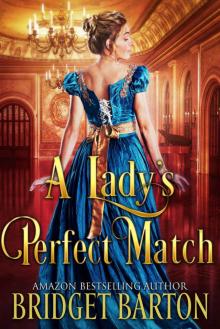 A Lady's Perfect Match: A Historical Regency Romance Book
A Lady's Perfect Match: A Historical Regency Romance Book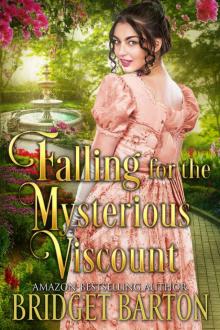 Falling for the Mysterious Viscount: A Historical Regency Romance Book
Falling for the Mysterious Viscount: A Historical Regency Romance Book Love Stories of Enchanting Ladies: A Historical Regency Romance Collection
Love Stories of Enchanting Ladies: A Historical Regency Romance Collection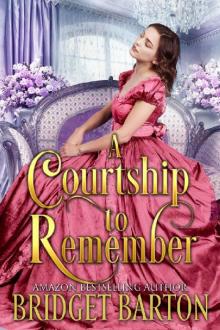 A Courtship to Remember: A Historical Regency Romance Book
A Courtship to Remember: A Historical Regency Romance Book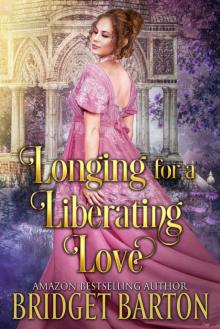 Longing for a Liberating Love: A Historical Regency Romance Book
Longing for a Liberating Love: A Historical Regency Romance Book Regency Romance Collection
Regency Romance Collection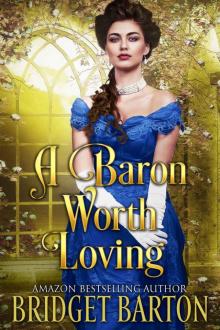 A Baron Worth Loving: A Historical Regency Romance Book
A Baron Worth Loving: A Historical Regency Romance Book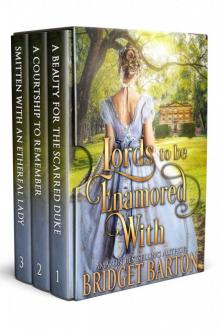 Lords to Be Enamored With: A Historical Regency Romance Collection
Lords to Be Enamored With: A Historical Regency Romance Collection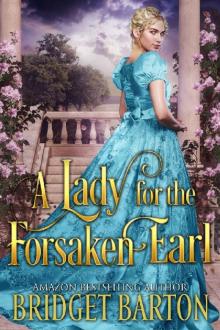 A Lady for the Forsaken Earl: A Historical Regency Romance Book
A Lady for the Forsaken Earl: A Historical Regency Romance Book Dukes to Fall in Love With: A Historical Regency Romance Collection
Dukes to Fall in Love With: A Historical Regency Romance Collection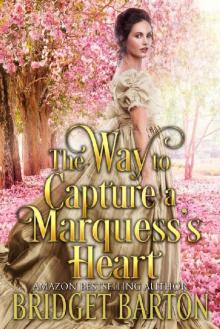 The Way to Capture a Marquess's Heart: A Historical Regency Romance Book
The Way to Capture a Marquess's Heart: A Historical Regency Romance Book The Lost Love of a Stunning Lady: A Historical Regency Romance Book
The Lost Love of a Stunning Lady: A Historical Regency Romance Book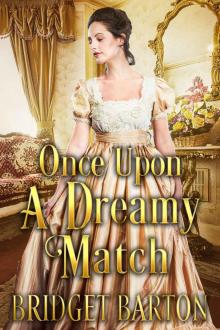 Once Upon a Dreamy Match: A Historical Regency Romance Book
Once Upon a Dreamy Match: A Historical Regency Romance Book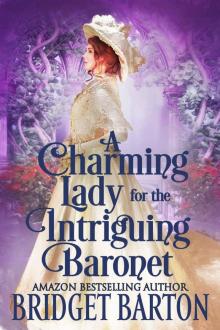 A Charming Lady for the Intriguing Baronet: A Historical Regency Romance Book
A Charming Lady for the Intriguing Baronet: A Historical Regency Romance Book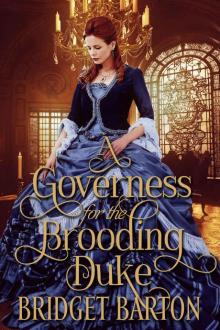 A Governess for the Brooding Duke: A Historical Regency Romance Book
A Governess for the Brooding Duke: A Historical Regency Romance Book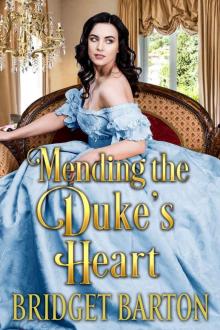 Mending the Duke's Heart: A Historical Regency Romance Book
Mending the Duke's Heart: A Historical Regency Romance Book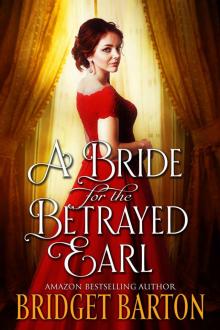 A Bride for the Betrayed Earl
A Bride for the Betrayed Earl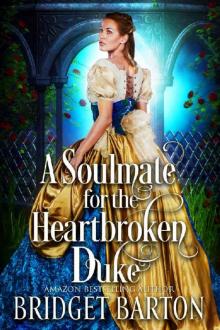 A Soulmate for the Heartbroken Duke
A Soulmate for the Heartbroken Duke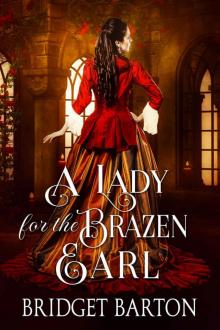 A Lady for the Brazen Earl: A Historical Regency Romance Book
A Lady for the Brazen Earl: A Historical Regency Romance Book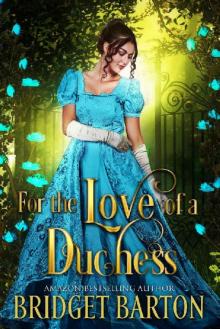 For the Love of a Duchess: A Historical Regency Romance Book
For the Love of a Duchess: A Historical Regency Romance Book A Damsel for the Mysterious Duke: A Historical Regency Romance Book
A Damsel for the Mysterious Duke: A Historical Regency Romance Book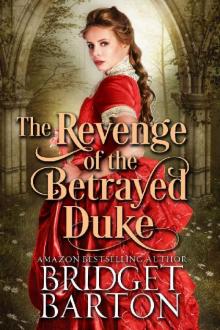 The Revenge of the Betrayed Duke: A Historical Regency Romance Book
The Revenge of the Betrayed Duke: A Historical Regency Romance Book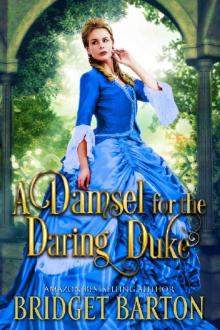 A Damsel for the Daring Duke
A Damsel for the Daring Duke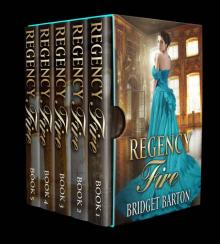 Regency Romance Collection: Regency Fire: The Historical Regency Romance Complete Series (Books 1-5)
Regency Romance Collection: Regency Fire: The Historical Regency Romance Complete Series (Books 1-5) A Damsel for the Mysterious Duke_A Historical Regency Romance
A Damsel for the Mysterious Duke_A Historical Regency Romance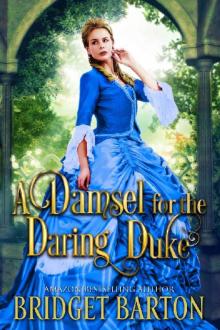 A Damsel for the Daring Duke_A Historical Regency Romance
A Damsel for the Daring Duke_A Historical Regency Romance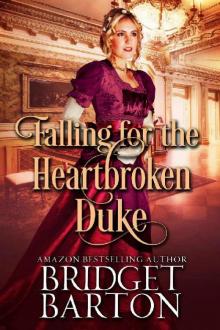 Falling for the Heartbroken Duke: A Historical Regency Romance Book
Falling for the Heartbroken Duke: A Historical Regency Romance Book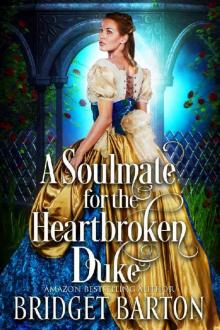 A Soulmate for the Heartbroken Duke: A Historical Regency Romance Book
A Soulmate for the Heartbroken Duke: A Historical Regency Romance Book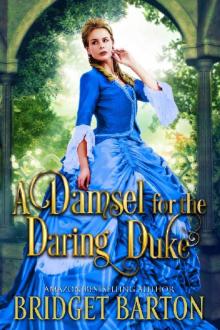 A Damsel for the Daring Duke: A Historical Regency Romance Book
A Damsel for the Daring Duke: A Historical Regency Romance Book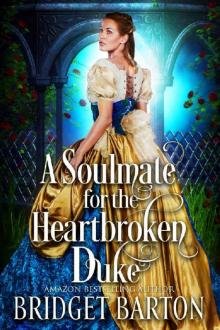 A Soulmate for the Heartbroken Duke_A Historical Regency Romance
A Soulmate for the Heartbroken Duke_A Historical Regency Romance A Damsel for the Mysterious Duke
A Damsel for the Mysterious Duke A Beauty for the Scarred Duke: A Historical Regency Romance Book
A Beauty for the Scarred Duke: A Historical Regency Romance Book Kind Ella and the Charming Duke_A Historical Regency Romance
Kind Ella and the Charming Duke_A Historical Regency Romance Kind Ella and the Charming Duke
Kind Ella and the Charming Duke